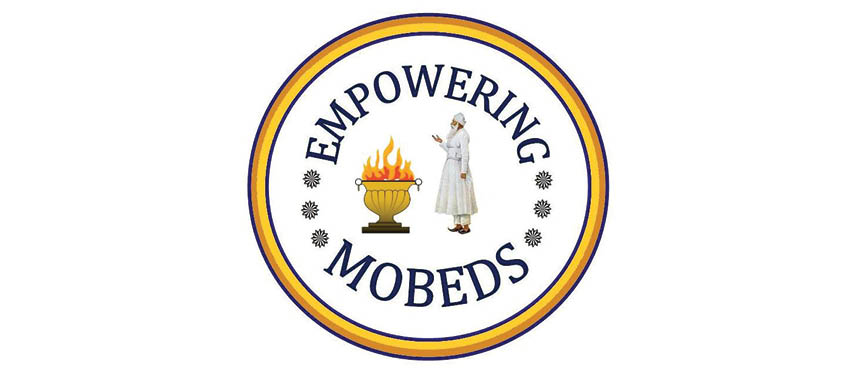Team Empowering Mobeds (EM) presented an insightful, relevant and informative webinar on 7th May, 2021, titled, ‘Challenges Faced By Full Time Practicing Parsi Priests’, on Jiyo Parsi’s Friday Forum platform which digitally facilitates the community to connect with important issues. Commencing the session with a warm welcome, event moderator Binaifer Sahukar shared how the webinar would provide a sneak peak of Mobedy at the grass root level and the inspiring stories of dedication and resilience. “By the end of the session, your love and admiration is going to be amped-up several notches for the men in white pagadis,” she said!
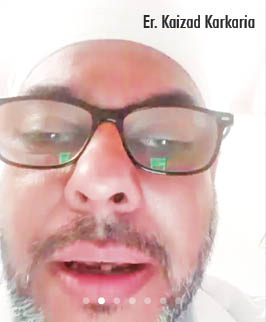 Ervad Kaizad Karkaria began auspiciously with a Humbandagi, invoking the blessings of Ahuramazda on the entire community. Chairperson of EM, Dinshaw Tamboly has, since 1996, been at the forefront of supporting Mobeds across various levels – medical, educational and various others, through the WZO Trust. In his welcome address, he stated, “On behalf of team EM, with sincere gratitude, I thank Jiyo Parsi for hosting this presentation and providing opportunities to a few members of EM to share their experiences on how they’ve coped with the pandemic. Team EM, over the few years of its formation, has encouraged and motivated Mobeds – young and old – to take pride in their colleagues; to provide leadership guidance to our community and evolve into role models that our community will be proud of.”
Ervad Kaizad Karkaria began auspiciously with a Humbandagi, invoking the blessings of Ahuramazda on the entire community. Chairperson of EM, Dinshaw Tamboly has, since 1996, been at the forefront of supporting Mobeds across various levels – medical, educational and various others, through the WZO Trust. In his welcome address, he stated, “On behalf of team EM, with sincere gratitude, I thank Jiyo Parsi for hosting this presentation and providing opportunities to a few members of EM to share their experiences on how they’ve coped with the pandemic. Team EM, over the few years of its formation, has encouraged and motivated Mobeds – young and old – to take pride in their colleagues; to provide leadership guidance to our community and evolve into role models that our community will be proud of.”
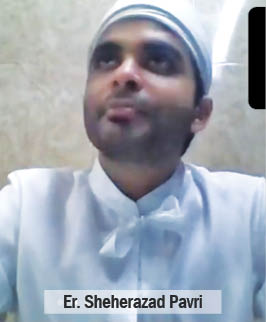 Binaifer introduced Er. Sheherazad Pavri, a resident of the Dadar Athornan Institute, who continues his ‘Avestan’ studies and performs his Mobed duties along with higher religious ceremonies, while running a successful digital marketing business. Er. Sheherazad spoke about the genesis and achievements of EM since its inception in 2017. He shared its objectives and emphasized on leadership through soft skills training, engaging with the laity and networking with fellow-Mobeds, pan India and globally.
Binaifer introduced Er. Sheherazad Pavri, a resident of the Dadar Athornan Institute, who continues his ‘Avestan’ studies and performs his Mobed duties along with higher religious ceremonies, while running a successful digital marketing business. Er. Sheherazad spoke about the genesis and achievements of EM since its inception in 2017. He shared its objectives and emphasized on leadership through soft skills training, engaging with the laity and networking with fellow-Mobeds, pan India and globally.
It started in December 2017 with a workshop in Masina Hospital. The 2nd event was with Jiyo Parsi at Reliance Hospital (Mumbai). There were digital training workshops for Mobeds and sessions on the importance of networking. Interactions with Vada Dasturji Firoze Kotwal and other priests as well as children (from XYZ); a heritage walk was in South Mumbai, interaction with participants from ‘the Return of Roots programme’; an offsite training program in Sanjan; sessions on team building and friendly football matches between Mobeds and Behdins. An initiative providing fire retardant Jamas to ensure the safety of Mobeds while conducting prayers was part of EM’s aim to better the quality of life for priests.
Speaking next was Er. Kaizad Karkaria – full time Mobed for three decades now and manager of Rustom Faramna Agiary, who also offers his services at Wadiaji Atashbehram. Et. Kaizad spoke about the challenges of a full time Mobed during lockdown. “The virus changed the fate of the entire world including ours,” he said. Mobeds are the torch bearers who keep the flame of religion aglow. “Us priests had to adapt, change and adjust to these circumstances that mankind has never seen before. Life grants nothing to us mortals without hard work. During lockdown, fire temples are closed by the government. Behdins are not allowed inside even though prayers are going on. The main income of Mobeds is derived from money put with the boi, jashans, weddings, navjotes etc. All this came to naught during these hard times. None of us have ever seen such Muktads, like last year, with no fruits or flowers being sold due to lockdown. We had ‘Muktads without Behdins’ for the first time in our lives. The ‘main problem’ we faced was ‘travelling’ to our respective Agiaries, Atashbehrams, Doongerwadi for the four-day ceremonies, and even give Boi’s. As priests weren’t included in essential services, the police posed a problem, on one occasion even humiliating us by making us do sit-ups!” He requested that Mobeds be issued ID cards from the authorities, police and municipality for their travel betterment so they could serve the holy fire.
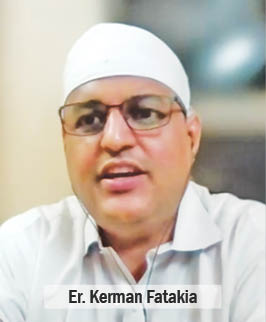 Practicing priest and curator of the Alpaiwalla Museum, Er. Kerman Fatakia, then spoke on the Unification of Mobeds due to Digitization, nationally and globally. Popular topics covered online included ‘Back to school’, ‘Recap of kusti prayers’, ‘Significance of Navjote Ceremony’, ‘Life of Prophet Zarathustra’, etc. The ‘Empowering Dialogue Series’ brought together Mobeds worldwide to discuss what their challenges and solutions during the pandemic. A quiz was conducted for XYZ children. “We were glad to know that the next generation is ready to learn from us and carry the torch of our community forward,” he concluded.
Practicing priest and curator of the Alpaiwalla Museum, Er. Kerman Fatakia, then spoke on the Unification of Mobeds due to Digitization, nationally and globally. Popular topics covered online included ‘Back to school’, ‘Recap of kusti prayers’, ‘Significance of Navjote Ceremony’, ‘Life of Prophet Zarathustra’, etc. The ‘Empowering Dialogue Series’ brought together Mobeds worldwide to discuss what their challenges and solutions during the pandemic. A quiz was conducted for XYZ children. “We were glad to know that the next generation is ready to learn from us and carry the torch of our community forward,” he concluded.
 Er. Cyrus Darbari was introduced as a scholar priest, a student of the Dadar Athornan Institute with an MA in Avestan language, and currently the Vice President of an IT company and a faculty member where he teaches Avesta to the Mobeds.
Er. Cyrus Darbari was introduced as a scholar priest, a student of the Dadar Athornan Institute with an MA in Avestan language, and currently the Vice President of an IT company and a faculty member where he teaches Avesta to the Mobeds.
He shared how there were only 150 to 200 full-time practicing priests in India today, with a majority practicing the daily routine prayers and offering Boi ceremonies across various Agiaries or Atash Adaran, performing prayers for the departed souls at the Tower of silence, performing Wedding and Navjote ceremonies, etc. “The overall workforce of priests is negligible to cater to the needs of the community. Priests are always on the move, with no time for themselves for leisure or relaxation,” he said. He spoke of the loneliness and the financial constraints due to lack of footfalls in the fire temples. He commended their resilience for performing priestly duties as a spiritual obligation and how it required highest levels of discipline, restraint from worldly temptations, sincerity, dedication, passion and punctuality. Having purity of mind, body and appearance to inspire respect were the qualities which provided the resilience to withstand setbacks and bounce back to normalcy. He thanked Teams Parzor and Jiyo Parsi headed by Dr. Shernaz Cama, ably assisted by Pearl Tirandaz and Mahatab for giving them this platform.
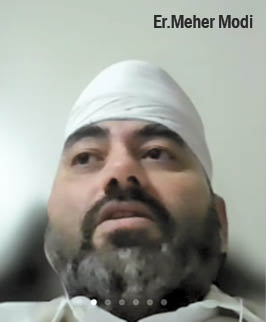 Next, Er. Meher Modi, who has served as a priest for 14 years at Aslaji Agiary and is presently serving at Saher Agiary, spoke about priests as leaders and future vision of EM. He said, “We often want Zoroastrian priests to be leaders not only in thought but also in deed. During Sassanian times, High Priests were counsellors to the king and were learned scholars who commanded respect. Today, the paucity of priests is evident and EM would like to be the catalyst and attract more priests into the profession. With the support and guidance of the Athornan Mandal and WZO Trust Funds, Mobeds are taking charge and executing programmes for the benefit of the community. EM’s goal is to provide a learning window to priests so they have necessary skills to navigate new challenges. Talking about the platform for future leaders is all about taking the initiative along with critical thinking and constant learning and moreover to motivate others. Their ideal vision is to be an organization where priests can look after themselves and they do not have to stretch their hands out and ask for support. They would also like to provide leaders to our community who can bring about a transformational change to its members because ‘Empowering Mobeds, Empowers our Community!”
Next, Er. Meher Modi, who has served as a priest for 14 years at Aslaji Agiary and is presently serving at Saher Agiary, spoke about priests as leaders and future vision of EM. He said, “We often want Zoroastrian priests to be leaders not only in thought but also in deed. During Sassanian times, High Priests were counsellors to the king and were learned scholars who commanded respect. Today, the paucity of priests is evident and EM would like to be the catalyst and attract more priests into the profession. With the support and guidance of the Athornan Mandal and WZO Trust Funds, Mobeds are taking charge and executing programmes for the benefit of the community. EM’s goal is to provide a learning window to priests so they have necessary skills to navigate new challenges. Talking about the platform for future leaders is all about taking the initiative along with critical thinking and constant learning and moreover to motivate others. Their ideal vision is to be an organization where priests can look after themselves and they do not have to stretch their hands out and ask for support. They would also like to provide leaders to our community who can bring about a transformational change to its members because ‘Empowering Mobeds, Empowers our Community!”
A Question Answer session followed. Dr. Shernaz Cama concluded with, “I am so happy to see how confident each one has got with time, how far this program has progressed – digitally connecting not only Mobeds, but everyone in the community! I am very happy and proud of all the good work EM has done.”
- Smriti Zubin Irani Holds Interactive Session With Parsi/Irani Anjumans - 5 November2022
- Parsi Rising Stars Of Cricket – Kayan And Saisha Ranina! - 29 October2022
- Shine On… P G Cricket’s Unmatched Sparkle! - 22 October2022
